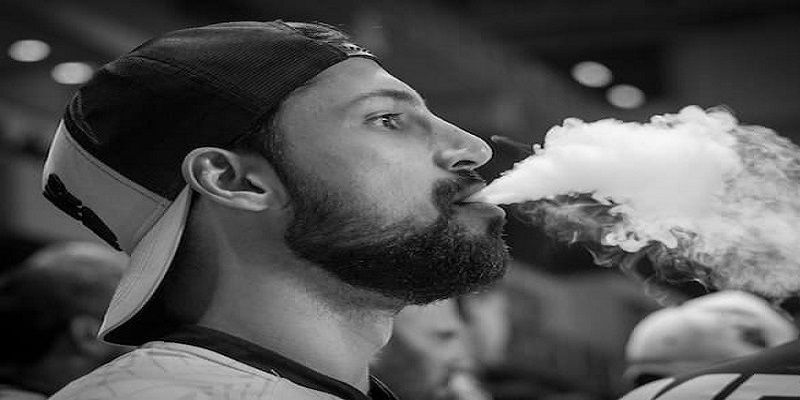
Tooth extractions are a relatively common dental procedure involving removing a tooth from its socket in the bone, after the extraction following proper post-operative care instructions after the extraction is crucial to promote healing and prevent complications. One concern for many people is how their regular habits, such as vaping, may be affected during recovery.
In recent years, vaping has gained significant popularity, especially among individuals who use cannabidiol (CBD) products for various reasons, such as pain management, anxiety relief, or relaxation. However, it is important to use caution and know how vaping may affect your healing from tooth extraction.
Let’s explore the factors that answer When can I vape after tooth extraction? the potential risks of vaping during the healing process, and practical guidelines to help you make an informed decision. Let’s get into the details!
Smoking or Vaping after tooth extraction
If you recently had a tooth extraction, and now you’re wondering when you can safely return to your vaping routine. Well, let’s talk about smoking or vaping after tooth extraction.
First, talk about why you should be cautious when lighting up or puffing away right after tooth extraction. When a tooth is pulled out, it leaves behind an open socket where the tooth used to be. This socket needs time to heal properly, and any form of smoking or vaping can potentially hinder that healing process.
The primary concern with smoking or vaping after a tooth extraction is the heat and chemicals involved. The hot smoke or vapor can irritate the extraction site, leading to inflammation, pain, or increased infection risk. Plus, the chemicals in cigarettes or some vape liquids can also harm the healing process.
Dentists recommend avoiding smoking or vaping for at least 48 to 72 hours after tooth extraction. This gives your mouth time to start healing and reduces the risk of complications.
Effects of Vaping on dental health
Vaping has gained popularity as an alternative to traditional smoking, but it’s important to be aware of its potential effects on dental health. The aerosol vaping devices produce contains chemicals, flavorings, and sometimes nicotine, which can impact our teeth and gums. The chemicals in vape aerosol and the physical impact of vaping on the oral cavity can contribute to tooth decay, gum disease, and other oral health issues. Practicing good oral hygiene, reducing the frequency of vaping, and seeking regular dental care is crucial for maintaining a healthy smile while minimizing potential risks.
Chemicals and Tooth Decay:
- Vape aerosol contains chemicals that can contribute to tooth decay.
- Sweet flavorings and sugary vape liquids increase the risk of cavities.
- Bacteria in the mouth feed on sugars, producing acid that damages tooth enamel.
Nicotine and Gum Health:
- Nicotine restricts blood flow, leading to gum problems.
- Increased risk of gum disease due to reduced blood flow.
- Nicotine can cause dry mouth, reducing saliva production.
Physical Impact of Vaping:
- Inhaling vapor can create a dry suction effect, irritating oral tissues.
- Delicate gum tissue surrounding the teeth can be damaged.
- The heat from vaping devices can raise oral cavity temperature, causing dryness and irritation.
The specific timeline for when it is safe to resume vaping after tooth extraction varies and should be determined by consulting your oral surgeon or dentist. Regarding questions like “When can I vape after tooth extraction?” it is best to seek personalized guidance based on your unique circumstances and healing progress.
Also Read, Is it bad to hit a burnt vape?
When can you vape after tooth extraction?
When vaping after a tooth extraction, allowing your mouth sufficient time to heal before resuming the habit is important. While every individual’s healing process may vary, here are some general guidelines to consider:
– Follow post-operative instructions: After tooth extraction, your dentist or oral surgeon will provide specific post-operative instructions for your recovery. Following these instructions carefully is crucial, as they are tailored to your unique situation.
– Wait 48 to 72 hours: It is generally advised to wait at least 48 to 72 hours before vaping after a tooth extraction. This allows the extraction site to start healing and reduces the risk of complications.
– Consult your dentist: It’s always best to consult with your dentist or oral surgeon before resuming vaping. They will assess your specific situation, including the extraction’s complexity, overall oral health, and any pre-existing conditions, to provide personalized advice on when it is safe to vape again.
– Monitor your healing progress: Close attention to how your mouth is healing. You must call your dentist right away if you have extreme pain, swelling, bleeding, or any other alarming signs. These could be signs of complications that may warrant further evaluation before you can safely vape.
Is it Okay to Vape right after tooth extraction?
No, it is generally not recommended to vape immediately after tooth extraction. Vaping involves inhaling hot vapor that can irritate the extraction site and potentially interfere with healing. Remember, prioritizing your oral health and allowing adequate time for healing is crucial after tooth extraction. By following professional advice and being patient, you can support a smooth recovery and minimize the potential risks of vaping too soon. There are a few reasons why it’s best to wait before resuming vaping:
1. Healing process:
After a tooth extraction, your mouth needs time to heal. The extraction site forms a blood clot that protects the underlying bone and tissues as they regenerate. Too soon, vaping can disrupt this clot or expose the healing tissues to heat and chemicals, potentially leading to complications.
2. Risk of dry socket:
One significant concern is the development of a condition called dry socket. When the blood clot in the extraction site becomes loose or dissolves too soon, a dry socket develops. This can cause severe pain and delay the healing process. Especially forcefully, vaping can create suction and increase the risk of developing a dry socket.
3. Chemical exposure:
Vape aerosol contains various chemicals, flavorings, and sometimes nicotine. These substances can irritate the sensitive tissues at the extraction site and may hinder the healing process. Chemical exposure can also increase the risk of infection or other complications.
To ensure proper healing and minimize the risk of complications, waiting at least 48 to 72 hours before resuming vaping after a tooth extraction is generally advised. Still, it’s basic to consult with your dentist or oral surgeon for personalized advice based on your specific situation. They will assess your healing progress and guide you when it is safe for you to resume vaping.
What happens when you vape after oral surgery?
If you start vaping immediately after oral surgery, it will affect your dental health and create problems in healing. Oral surgery often involves the extraction of teeth, the placement of dental implants, or other procedures that require the surgical manipulation of oral tissues.
After oral surgery, the formation of blood clots in the surgical area after oral surgery is crucial for healing and preventing excessive bleeding. Vaping involves inhaling and exhaling vapor, creating suction or negative pressure in the mouth. This suction can dislodge or disrupt the blood clot, leading to a dry socket condition. Dry socket delays healing and causes significant pain.
Vaping can contribute to dry mouth, a common side effect of using e-cigarettes. A dry mouth can hinder the healing process by reducing saliva production, which is crucial in maintaining oral health. Saliva helps cleanse the mouth, regulate pH levels, and provide essential nutrients for healing.
To ensure optimal healing after oral surgery, avoid vaping, smoking, or using tobacco or nicotine products for a specified period, typically at least a week or as your oral surgeon advises. It’s important to follow the post-operative instructions provided by your dental professional and consult with them if you have any specific concerns or questions regarding your recovery.
How to continue vaping after tooth extraction?
After tooth extraction or oral surgery, avoiding vaping or using tobacco or nicotine products is generally advised. However, if you still wish to continue vaping, it is crucial to consult with your oral surgeon or dentist beforehand. They can provide personalized guidance based on your specific case, answer your question When can I vape after tooth extraction, and offer insights into whether it is safe to continue vaping or if it is advisable to abstain for a certain period. Remember that their recommendations are crucial for ensuring proper healing and minimizing potential complications. Prioritizing your oral health and following their expert advice to promote a smooth and successful recovery after oral surgery is essential.
Conclusion
As for the question, “When can I vape after tooth extraction?” it is best to avoid smoking or vaping for a certain period and let your mouth heal first. Because hot smoke can create problems in healing and increase the pain after tooth extraction, risks of dry sockets can be increased if you continue or start smoking right after tooth extraction. This is also not advised because it causes irritation and inflammation, increases the risks of infection, and causes dryness in the mouth. Make sure to consult with your oral surgeon or dentist for personalized guidance. They can provide specific recommendations based on your individual case, considering factors such as the surgery’s extent and overall oral health.
FAQs
Q: Can I vape immediately after tooth extraction?
A: No, avoiding vaping or using tobacco or nicotine products is generally recommended immediately after tooth extraction. Allow the extraction site to form a blood clot and begin healing before introducing any potential irritants or disruptors.
Q: How long should I wait before vaping after tooth extraction?
A: The specific time frame for when it is safe to resume vaping after tooth extraction can vary depending on the individual case and the extent of the surgery. It is best to consult your oral surgeon or dentist for personalized instructions. In general, it may take at least a week or longer for the extraction site to heal sufficiently before considering vaping again.
Q: Can vaping after tooth extraction cause complications?
A: Yes, vaping after tooth extraction can potentially cause complications. It can disrupt the formation of blood clots, leading to dry sockets and delaying the healing process. Vaping can also irritate the surgical site, increase the risk of infection, and contribute to dryness and dehydration, which can hinder proper healing.
Q: Is it safe to use nicotine-free e-cigarettes or vape pens after tooth extraction?
A: While nicotine-free e-cigarettes may lack the addictive substance, they can still introduce potential irritants and disrupt the healing process. The aerosol, flavorings, and additives in e-cigarettes can irritate the surgical site and prolong recovery. During the initial healing period, it is generally recommended to abstain from vaping altogether, including nicotine-free options.








